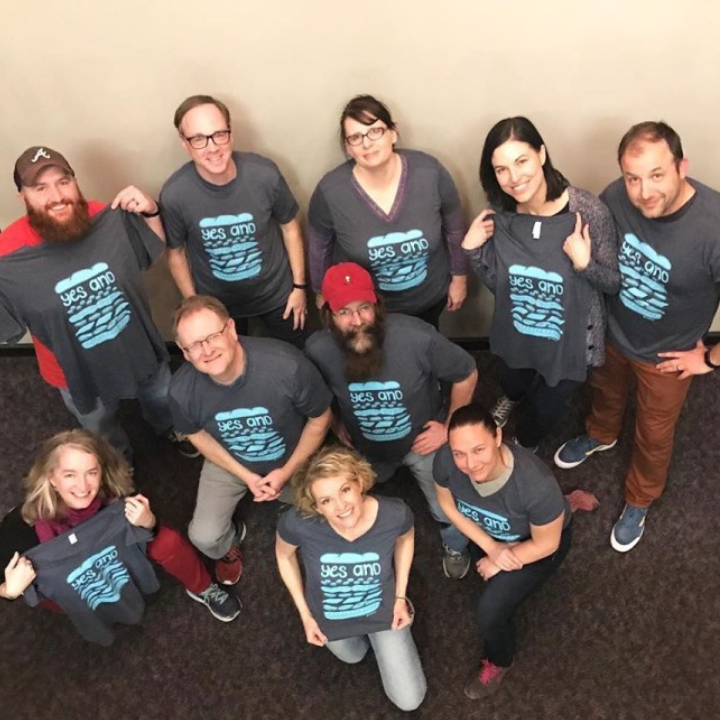Lessons from Improv on Teamwork and Collaboration

By Julie Springer
June 23, 2022
Over the past few years, our coaching team at Conduo has studied improv for business, to practice being creative and thinking on our feet. One of the first things we learned was to say, "Yes, and" in response to whatever is offered - a very important skill for our work in coaching and facilitating groups. Saying, “Yes, and" is foundational because you are acknowledging and building on what the other person has started, rather than competing or dismissing their contribution.
Here we are with our improv class, showing off our "Yes, And" t-shirts!

As we dug deeper into improv and how to apply it in a business setting, we gained some powerful insights that apply directly to the work we do with coaching leadership teams on how to develop Business Agility.
Insights
Insight 1: Teamwork means dropping your personal agenda and committing to the shared goal.
I learned this when playing an improv game where you stand in a circle and try not to laugh as goofy phrases and facial expressions are passed around the group. I thought I was totally nailing it because I kept a straight face and didn't laugh the entire game. When the game ended, the improv coach tactfully shared that this game is not so much about individual success but about what the group is creating together. She said, "It's not much fun if you're not laughing." After a moment of feeling sheepish, I was really grateful for the new perspective.
When I focus on proving my own abilities, I run the risk of missing the whole point of what is happening with the group. For the leadership teams we work with, this means dropping personal priorities ("my work," "my area") and aligning around THE priority for the organization.
Insight 2: There is an important difference between collaboration and coordination.
Improv is about creating something collectively, in the moment. It's about offering what you have, making space for others to add to it and then working with whatever they bring. Thinking ahead or focusing on making your part "good" or being clever is a sure bet that the performance will fall flat.
This offers a great analogy for how high-performing organizations shift from silos, where each group owns their part and then coordinates a hand-off to other groups, to working in cross-functional teams. Cross-functional teams work together across areas, collaborating to deliver the product or service that is needed. They share a common goal, timeline and priorities. They optimize for the whole, even at the expense of individual performance.
A Program Manager over the Training Unit in one organization we work with said it best when he explained:
"This would be a lot easier if I could just focus on what we need to do for the training unit, but I get that it's more important for me to support the entire team in delivering on this project, and training is just one piece."
The Value of Applying the Improv Mindset
To get started with applying improv to the way you work, develop awareness of how you are showing up for meetings and interactions and consider how you might be more open and creative in the way you work with others. As Bob Kalhun, author of the book, “Getting to Yes, And” puts it, “Trust the common goal and that you are getting there, even if it moves a different way.”
Keep these three key behaviors in mind:
- Respond - Be present, focused, open and honest
- Adapt - Take in what is happening and adjust, keeping the goal in mind
- Connect - Listen and accept what others are sharing, and then build on their contributions
Improv has been a transformative approach, not only to how I show up when standing in front of a room, but to my understanding of teamwork and Agility. I've learned to be more curious about what is possible when working with others and less focused on having things go "my way." It’s a powerful way for any leader to create an environment for creativity and collaboration, enabling you and your teams to focus on what's most important, deliver value more quickly and develop strong working relationships.


